师范类英语专业与非师范类英语专业学习对比性研究
- 格式:doc
- 大小:24.00 KB
- 文档页数:5
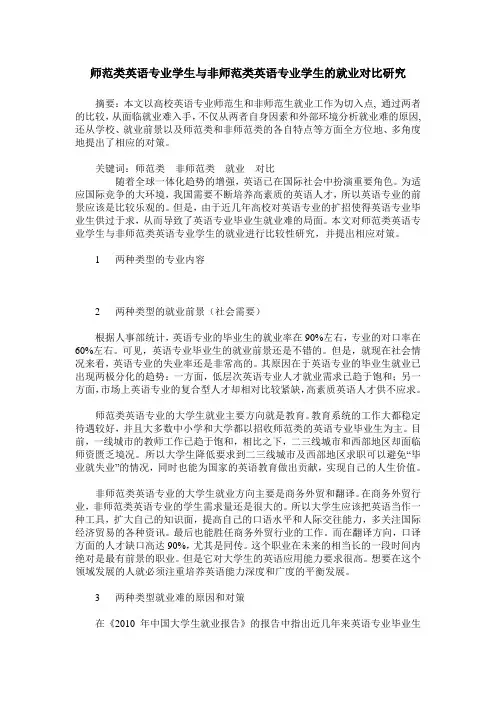
师范类英语专业学生与非师范类英语专业学生的就业对比研究摘要:本文以高校英语专业师范生和非师范生就业工作为切入点, 通过两者的比较,从面临就业难入手,不仅从两者自身因素和外部环境分析就业难的原因, 还从学校、就业前景以及师范类和非师范类的各自特点等方面全方位地、多角度地提出了相应的对策。
关键词:师范类非师范类就业对比随着全球一体化趋势的增强,英语已在国际社会中扮演重要角色。
为适应国际竞争的大环境,我国需要不断培养高素质的英语人才,所以英语专业的前景应该是比较乐观的。
但是,由于近几年高校对英语专业的扩招使得英语专业毕业生供过于求,从而导致了英语专业毕业生就业难的局面。
本文对师范类英语专业学生与非师范类英语专业学生的就业进行比较性研究,并提出相应对策。
1 两种类型的专业内容2 两种类型的就业前景(社会需要)根据人事部统计,英语专业的毕业生的就业率在90%左右,专业的对口率在60%左右。
可见,英语专业毕业生的就业前景还是不错的。
但是,就现在社会情况来看,英语专业的失业率还是非常高的。
其原因在于英语专业的毕业生就业已出现两极分化的趋势:一方面,低层次英语专业人才就业需求已趋于饱和;另一方面,市场上英语专业的复合型人才却相对比较紧缺,高素质英语人才供不应求。
师范类英语专业的大学生就业主要方向就是教育。
教育系统的工作大都稳定待遇较好,并且大多数中小学和大学都以招收师范类的英语专业毕业生为主。
目前,一线城市的教师工作已趋于饱和,相比之下,二三线城市和西部地区却面临师资匮乏境况。
所以大学生降低要求到二三线城市及西部地区求职可以避免“毕业就失业”的情况,同时也能为国家的英语教育做出贡献,实现自己的人生价值。
非师范类英语专业的大学生就业方向主要是商务外贸和翻译。
在商务外贸行业,非师范类英语专业的学生需求量还是很大的。
所以大学生应该把英语当作一种工具,扩大自己的知识面,提高自己的口语水平和人际交往能力,多关注国际经济贸易的各种资讯。
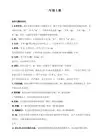
英语专业(师范类)人才培养方案1一、专业代码及专业名称、学制、授予学位050201 英语四年文学学士二、专业培养目标及要求培养目标:本专业培养德、智、体、美全面发展,具备英语语言的基础知识、基本理论和基本技能,具有较熟练的英语语言运用能力,能够在中等学校进行英语教学和教学研究的教师及其他教育工作者,并为研究生教育输送优质生源。
培养要求:本专业学生主要学习英语语言基础知识,受到英语听、说、读、写、译等方面的语言基本技能训练,能够较熟练的使用计算机进行英语及汉语语言文字处理,通过教育理论课程和教育实习环节形成良好的教师素养,获得从事英语教学和英语教育研究的基本能力。
毕业生应获得以下几方面的知识和能力:1.掌握英语语音、词汇、语法等基础知识,具备听、说、读、写、译等基本技能;2.具有较好的汉英表达能力和英汉互译能力;3.初步了解主要英语国家的历史和现状,对主要英语国家社会和文化有概括的了解;4.了解英语语言文学学科的新发展,具有基本的科学文化素质和艺术素养,并具有一定的创新精神和实践能力;5.熟悉教育法规,能够初步运用教育学、心理学及英语教学基本理论解决实际问题,具备良好的教师职业素质和从事英语教学的基本能力;6.掌握文献检索、资料查询及运用现代信息技术获得相应信息的基本方法,具有一定的科研能力;三、主要课程综合英语、高级英语、英语泛读、英语听力、英语口语、英语写作、英译汉、汉译英、英语语音、英语语法、英美概况、英语语言学、英国文学、美国文学、日语、教育学、心理学、现代教育技术、英语教学论。
四、主要实践性教学环节教育实习、毕业论文等。
五、学位及学分要求本专业学生在校学习期间必须修满教学计划规定的169学分方能毕业。
符合《中华人民共和国学位授予条例》和《南阳师范学院学士学位授予办法》规定者,授予文学学士学位。
六、英语专业(师范类)人才培养方案课程结构及学时、学分分配表七、英语专业(师范类)人才培养方案英语专业课程计划总表2。
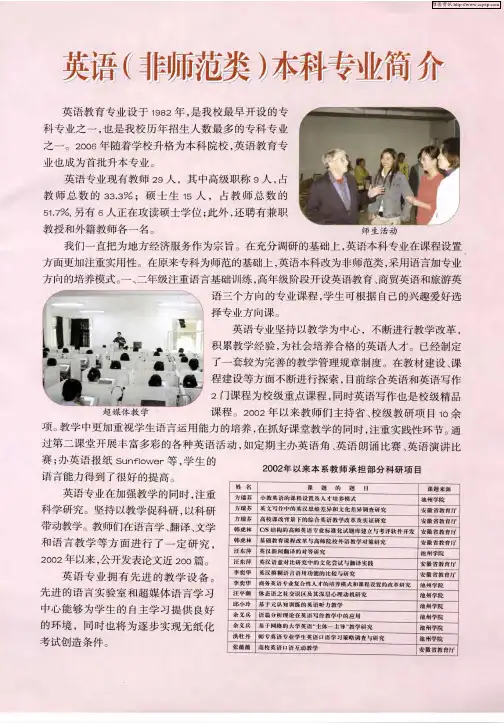
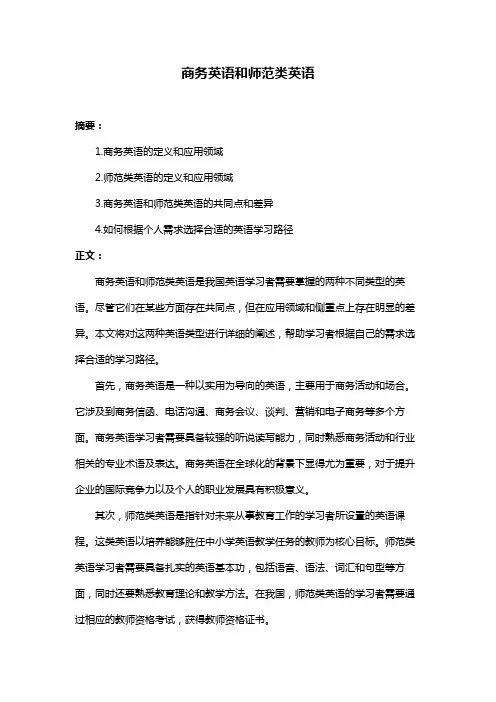
商务英语和师范类英语摘要:1.商务英语的定义和应用领域2.师范类英语的定义和应用领域3.商务英语和师范类英语的共同点和差异4.如何根据个人需求选择合适的英语学习路径正文:商务英语和师范类英语是我国英语学习者需要掌握的两种不同类型的英语。
尽管它们在某些方面存在共同点,但在应用领域和侧重点上存在明显的差异。
本文将对这两种英语类型进行详细的阐述,帮助学习者根据自己的需求选择合适的学习路径。
首先,商务英语是一种以实用为导向的英语,主要用于商务活动和场合。
它涉及到商务信函、电话沟通、商务会议、谈判、营销和电子商务等多个方面。
商务英语学习者需要具备较强的听说读写能力,同时熟悉商务活动和行业相关的专业术语及表达。
商务英语在全球化的背景下显得尤为重要,对于提升企业的国际竞争力以及个人的职业发展具有积极意义。
其次,师范类英语是指针对未来从事教育工作的学习者所设置的英语课程。
这类英语以培养能够胜任中小学英语教学任务的教师为核心目标。
师范类英语学习者需要具备扎实的英语基本功,包括语音、语法、词汇和句型等方面,同时还要熟悉教育理论和教学方法。
在我国,师范类英语的学习者需要通过相应的教师资格考试,获得教师资格证书。
商务英语和师范类英语在实际应用中有一定的交集,例如在教育行业的商务活动中,教师可能需要运用商务英语进行沟通。
然而,在整体上,它们在应用领域和侧重点上存在明显的差异。
商务英语注重实际应用和行业特定的知识,而师范类英语则关注教育理论和教学方法。
因此,学习者在选择英语学习路径时,需要结合自身的兴趣、职业规划和实际需求进行综合考虑。
总之,商务英语和师范类英语是我国英语学习者需要关注的两种不同类型的英语。
学习者应根据自己的需求和目标,选择合适的学习路径,从而提高英语水平,为未来的职业发展打下坚实的基础。
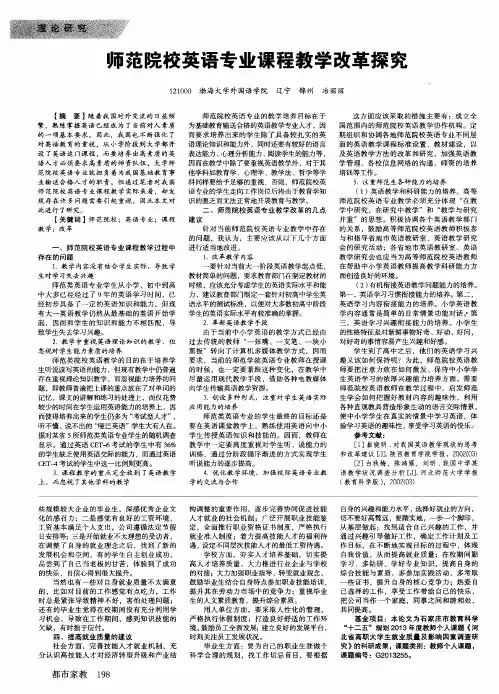
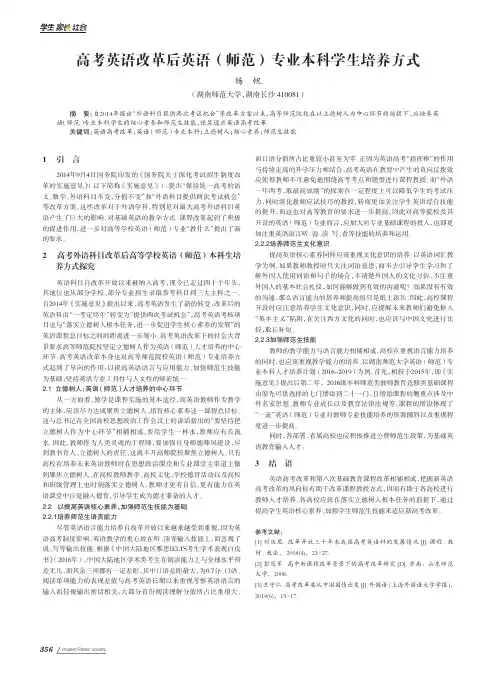
student Parent society3561 引 言2014年9月4日国务院印发的 《国务院关于深化考试招生制度改革的实施意见》 (以下简称 《实施意见》 ) ,提出“保持统一高考的语文、数学、外语科目不变,分值不变”和“外语科目提供两次考试机会”等改革方案。
这些改革对于外语学科,特别是对最大高考外语科目英语产生了巨大的影响,对基础英语的教学方式、课程改革起到了积极的促进作用,进一步对高等学校英语 (师范) 专业“教什么”提出了新的要求。
2 高考外语科目改革后高等学校英语(师范)本科生培养方式探究英语科目自改革开放以来被纳入高考,现今已走过四十个年头,其地位也从部分学校、部分专业招生录取参考科目到三大主科之一。
自2014年 《实施意见》 提出以来,高考英语发生了新的转变:改革后的英语科由“一考定终生”转变为“提供两次考试机会”,高考英语考核项目也与“落实立德树人根本任务,进一步促进学生核心素养的发展”的英语课程总目标之间的距离进一步缩小。
高考英语改革下的社会大背景要求高等师范院校坚定立德树人作为英语 (师范) 人才培养的中心环节。
高考英语改革本身也对高等师范院校英语 (师范) 专业培养方式起到了导向的作用:以提高英语语言与应用能力、加强师范生技能为基础;坚持英语专业工具性与人文性的辩证统一。
2.1 立德树人:英语 (师范) 人才培养的中心环节从一方面看,教学是课程实施的基本途径,而英语教师作为教学的主体,应该尽力达成聚焦立德树人、培育核心素养这一课程总目标。
这与总书记在全国高校思想政治工作会议上的讲话指出的“要坚持把立德树人作为中心环节”相辅相成。
要给学生一杯水,教师应有长流水。
因此,教师作为人类灵魂的工程师,要加强自身师德师风建设,尽到教书育人、立德树人的责任,这离不开高师院校聚焦立德树人。
只有高校在培养未来英语教师时在思想政治课堂和专业课堂主渠道上做到聚焦立德树人,在高校教师教学、高校文化、学校德育活动以及高校和班级管理上也时刻落实立德树人,教师才更有自信、更有能力在英语课堂中自觉融入德育,引导学生成为德才兼备的人才。
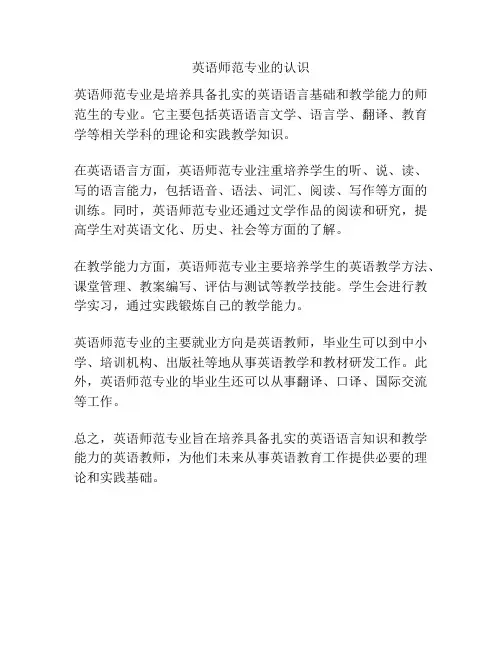
英语师范专业的认识
英语师范专业是培养具备扎实的英语语言基础和教学能力的师范生的专业。
它主要包括英语语言文学、语言学、翻译、教育学等相关学科的理论和实践教学知识。
在英语语言方面,英语师范专业注重培养学生的听、说、读、写的语言能力,包括语音、语法、词汇、阅读、写作等方面的训练。
同时,英语师范专业还通过文学作品的阅读和研究,提高学生对英语文化、历史、社会等方面的了解。
在教学能力方面,英语师范专业主要培养学生的英语教学方法、课堂管理、教案编写、评估与测试等教学技能。
学生会进行教学实习,通过实践锻炼自己的教学能力。
英语师范专业的主要就业方向是英语教师,毕业生可以到中小学、培训机构、出版社等地从事英语教学和教材研发工作。
此外,英语师范专业的毕业生还可以从事翻译、口译、国际交流等工作。
总之,英语师范专业旨在培养具备扎实的英语语言知识和教学能力的英语教师,为他们未来从事英语教育工作提供必要的理论和实践基础。
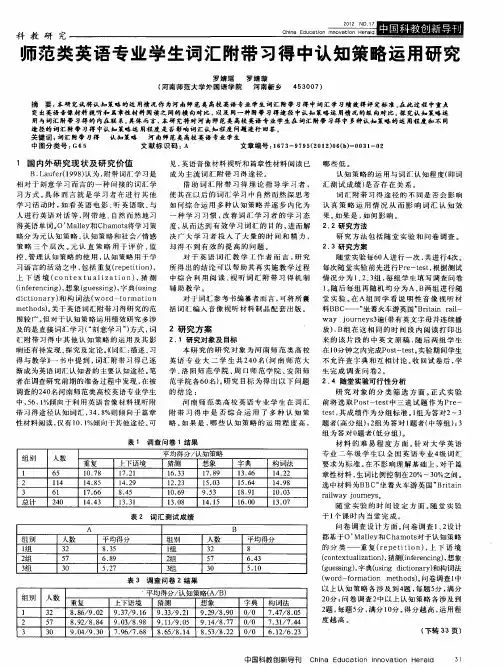
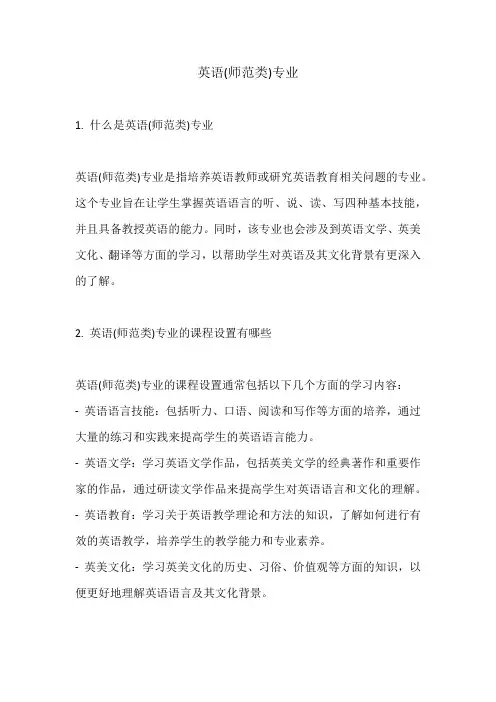
英语(师范类)专业1. 什么是英语(师范类)专业英语(师范类)专业是指培养英语教师或研究英语教育相关问题的专业。
这个专业旨在让学生掌握英语语言的听、说、读、写四种基本技能,并且具备教授英语的能力。
同时,该专业也会涉及到英语文学、英美文化、翻译等方面的学习,以帮助学生对英语及其文化背景有更深入的了解。
2. 英语(师范类)专业的课程设置有哪些英语(师范类)专业的课程设置通常包括以下几个方面的学习内容:-英语语言技能:包括听力、口语、阅读和写作等方面的培养,通过大量的练习和实践来提高学生的英语语言能力。
-英语文学:学习英语文学作品,包括英美文学的经典著作和重要作家的作品,通过研读文学作品来提高学生对英语语言和文化的理解。
-英语教育:学习关于英语教学理论和方法的知识,了解如何进行有效的英语教学,培养学生的教学能力和专业素养。
-英美文化:学习英美文化的历史、习俗、价值观等方面的知识,以便更好地理解英语语言及其文化背景。
3. 英语(师范类)专业的就业前景如何英语(师范类)专业的毕业生通常有以下几种就业方向:-英语教师:毕业生可以在中小学、大学、培训机构等地从事英语教学工作,教授英语语言和文学课程。
-翻译与口译:毕业生可以从事翻译或口译工作,将英语与其他语言进行互译,为跨文化交流提供专业服务。
-出版与传媒:毕业生可以在出版社、媒体等机构从事编辑、撰稿、翻译等相关工作,参与英语出版物的制作和宣传。
-考研与研究:毕业生可以选择继续深造,攻读硕士或博士学位,从事英语教育研究或相关学科的研究工作。
4. 英语(师范类)专业的学习需要具备哪些能力和特点英语(师范类)专业的学习需要具备以下几个能力和特点:-英语语言能力:学生需要具备一定的英语语言水平,能够流利地听说读写英语,以便进行专业学习和教学实践。
-专业知识和理论:学生需要学习英语语言和文学的专业知识,了解相关的理论和研究方法,以便进行教学和研究工作。
-教学技能:学生需要具备一定的教学技能,包括教学计划的制定、教学方法的选择和教学资源的利用等方面的能力。
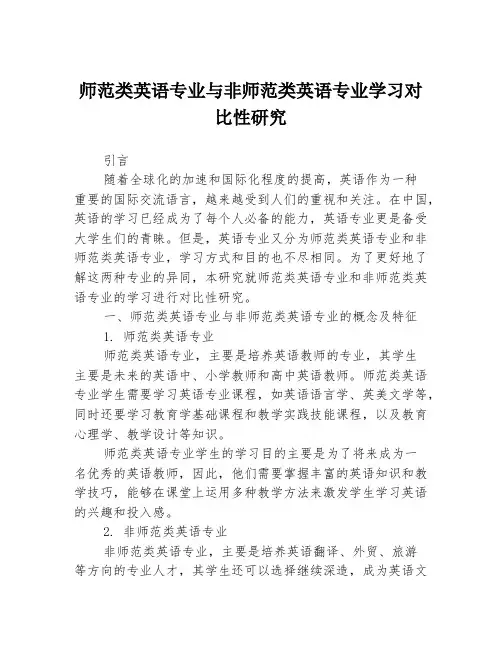
师范类英语专业与非师范类英语专业学习对比性研究引言随着全球化的加速和国际化程度的提高,英语作为一种重要的国际交流语言,越来越受到人们的重视和关注。
在中国,英语的学习已经成为了每个人必备的能力,英语专业更是备受大学生们的青睐。
但是,英语专业又分为师范类英语专业和非师范类英语专业,学习方式和目的也不尽相同。
为了更好地了解这两种专业的异同,本研究就师范类英语专业和非师范类英语专业的学习进行对比性研究。
一、师范类英语专业与非师范类英语专业的概念及特征1. 师范类英语专业师范类英语专业,主要是培养英语教师的专业,其学生主要是未来的英语中、小学教师和高中英语教师。
师范类英语专业学生需要学习英语专业课程,如英语语言学、英美文学等,同时还要学习教育学基础课程和教学实践技能课程,以及教育心理学、教学设计等知识。
师范类英语专业学生的学习目的主要是为了将来成为一名优秀的英语教师,因此,他们需要掌握丰富的英语知识和教学技巧,能够在课堂上运用多种教学方法来激发学生学习英语的兴趣和投入感。
2. 非师范类英语专业非师范类英语专业,主要是培养英语翻译、外贸、旅游等方向的专业人才,其学生还可以选择继续深造,成为英语文学方面的专家。
非师范类英语专业的学生需要掌握扎实的英语基础知识,包括语法、词汇、语言交际和阅读理解等,同时也需要学习各类专业课程,如英语写作、口译、笔译等。
在此基础上,学生还需要具备一定的专业技能,如如熟练运用电脑、掌握专业术语以及熟悉不同领域的文化背景等。
非师范类英语专业学生的学习目的主要是为了将来在英语翻译、外贸、旅游等行业中应用英语,因此他们需要掌握良好的英语基础知识和专业技能。
二、师范类英语专业与非师范类英语专业的学习对比1. 学习内容对比师范类英语专业学生需要学习教育学、教育心理学等教育学基础课程以及各种英语专业课程,如语言学、文学等。
同时,他们还需要进行教学实践和教学设计等训练。
因此,师范类英语专业学生的课程设置更偏向于教育学和教学技能的培养。
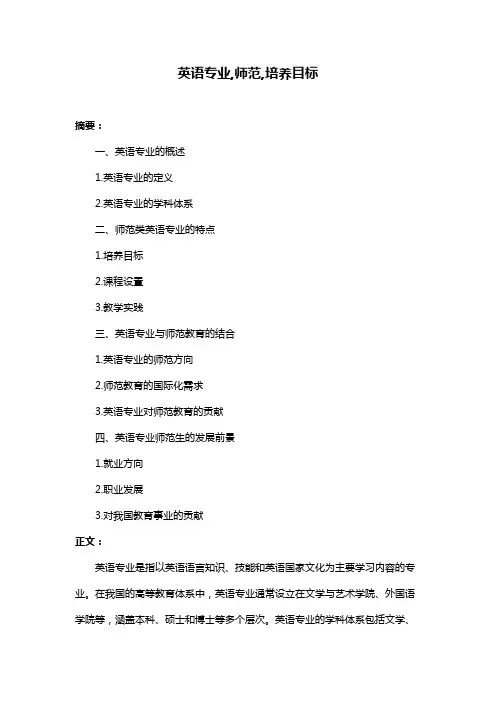
英语专业,师范,培养目标摘要:一、英语专业的概述1.英语专业的定义2.英语专业的学科体系二、师范类英语专业的特点1.培养目标2.课程设置3.教学实践三、英语专业与师范教育的结合1.英语专业的师范方向2.师范教育的国际化需求3.英语专业对师范教育的贡献四、英语专业师范生的发展前景1.就业方向2.职业发展3.对我国教育事业的贡献正文:英语专业是指以英语语言知识、技能和英语国家文化为主要学习内容的专业。
在我国的高等教育体系中,英语专业通常设立在文学与艺术学院、外国语学院等,涵盖本科、硕士和博士等多个层次。
英语专业的学科体系包括文学、语言学、翻译、教育等多个领域。
师范类英语专业是指在培养英语专业人才的基础上,注重培养学生的教育教学能力,使其具备担任英语教师的能力。
这类专业的培养目标主要是培养德、智、体、美全面发展的社会主义事业建设者和接班人,具备较高的英语语言水平、跨文化交际能力、教育教学能力以及一定的科研能力。
师范类英语专业的课程设置除了包括英语专业的核心课程外,还增设了教育学、心理学、教学法等相关课程,注重培养学生的教育教学能力。
此外,师范类英语专业还强调教学实践,通过教育实习、微格教学等实践环节,使学生能够在真实的教学环境中锻炼自己的教育教学能力。
英语专业与师范教育的结合,既满足了我国教育事业对英语教师的需求,又为英语专业学生提供了更广阔的就业方向。
英语专业的师范方向毕业生,除了可以从事一般的英语工作外,还可以选择成为英语教师,为我国的教育事业贡献力量。
英语专业师范生的发展前景十分广阔。
首先,他们在就业市场上具有较高的竞争力,因为具备英语专业知识和教育教学能力。
其次,随着教育国际化的推进,英语教师的需求将持续增长。
雷万鹏李贞义(华中师范大学,湖北武汉430079)师范与非师范毕业生教师身份认同差异及政策启示摘要:随着教师教育体系不断由封闭走向开放,我国教师队伍来源结构日趋多元,非师范毕业生构成了教师队伍的重要力量。
从教师专业发展视角看,师范与非师范毕业生质量差异如何,人们对此还存在较大争议。
利用“湖北省教师教育改革”调查数据,采用倾向得分匹配法(PSM )探讨师范与非师范毕业生教师身份认同差异问题,研究发现:整体上师范毕业生在教师身份认同及其子维度上显著高于非师范毕业生;异质性检验表明,就读师范专业对教师身份认同的影响在性别间和学段间有显著差异,在城乡间不存在显著差异。
相对而言,就读师范专业对女教师、小学教师和初中教师身份认同有更显著影响。
长远看,我国教师政策需要在“优者从教”和“教者从优”上同步发力,一方面构建有效的教师准入机制,筛选更多优秀毕业生进入教师队伍,另一方面应针对非师范毕业教师的特点因需施策,促进其专业成长。
关键词:师范毕业生;非师范毕业生;教师身份认同中图分类号:G525.1文献标识码:A文章编号:1672-4038(2021)02-0086-10为解决教师数量不足,尤其是农村教师短缺的问题,近年来,国家和地方出台了一系列教师补充政策,尤其是“三支一扶”计划和“特岗计划”创新了农村教师补充机制,为农村补充了大量师资。
但是,旨在缓解农村教师缺口的教师补充政策对应聘者是否具备“师范”背景没有严格要求,由此导致部分非师范毕业生进入教师队伍。
统计显示,2018年非师范生已占全国当年录用毕业生的33.5%,[1]教师教育体系由封闭走向开放,拓展了教师供给渠道,有效缓解了农村地区教师短缺问题。
但是,当前应急式的教师补充政策也暴露出诸多问题。
相比师范毕业生,非师范毕业生没有系统地接受教师教育培养,也缺乏浓厚的师范文化熏陶,能否胜任一线教育需求,这是一个值得探讨的话题。
围绕师范毕业生与非师范毕业生质量差异问题,人们众说纷纭,莫衷一是。
英语专业(师范类)人才培养方案1一、专业代码及专业名称、学制、授予学位050201 英语四年文学学士二、专业培养目标及要求培养目标:本专业培养德、智、体、美全面发展,具备英语语言的基础知识、基本理论和基本技能,具有较熟练的英语语言运用能力,能够在中等学校进行英语教学和教学研究的教师及其他教育工作者,并为研究生教育输送优质生源。
培养要求:本专业学生主要学习英语语言基础知识,受到英语听、说、读、写、译等方面的语言基本技能训练,能够较熟练的使用计算机进行英语及汉语语言文字处理,通过教育理论课程和教育实习环节形成良好的教师素养,获得从事英语教学和英语教育研究的基本能力。
毕业生应获得以下几方面的知识和能力:1.掌握英语语音、词汇、语法等基础知识,具备听、说、读、写、译等基本技能;2.具有较好的汉英表达能力和英汉互译能力;3.初步了解主要英语国家的历史和现状,对主要英语国家社会和文化有概括的了解;4.了解英语语言文学学科的新发展,具有基本的科学文化素质和艺术素养,并具有一定的创新精神和实践能力;5.熟悉教育法规,能够初步运用教育学、心理学及英语教学基本理论解决实际问题,具备良好的教师职业素质和从事英语教学的基本能力;6.掌握文献检索、资料查询及运用现代信息技术获得相应信息的基本方法,具有一定的科研能力;三、主要课程综合英语、高级英语、英语泛读、英语听力、英语口语、英语写作、英译汉、汉译英、英语语音、英语语法、英美概况、英语语言学、英国文学、美国文学、日语、教育学、心理学、现代教育技术、英语教学论。
四、主要实践性教学环节教育实习、毕业论文等。
五、学位及学分要求本专业学生在校学习期间必须修满教学计划规定的169学分方能毕业。
符合《中华人民共和国学位授予条例》和《南阳师范学院学士学位授予办法》规定者,授予文学学士学位。
六、英语专业(师范类)人才培养方案课程结构及学时、学分分配表七、英语专业(师范类)人才培养方案英语专业课程计划总表2附表〈一〉:全校公共必修课程。
英语就业前景分析英语就业前景分析(一)英语专业就业方向一、教育师范类截止到2006年,中国国内英语培训机构已达五万家.众多高端的英语教育机构已把竞争的焦点放在了师资力量的竞争上,对优秀教师争夺正趋于白热化.我国目前紧缺的并不是会讲几句外语、能听懂几句外国话的人,而是比较高级的英语人才.对于纯粹英语专业的学生来说,应该在扩大自己视野的基础上向更专业的方向发展以增强专业竞争力.因此就英语专业就业前景来看,教育师范类是一个不错的选择。
二、翻译同传、高级翻译多有"钱途"?这里就不说了,真正感兴趣的会想办法知道的.单说翻译涉外企事业单位、研究所、情报所、新闻出版、政府机关等从事专业技术翻译、翻译管理、涉外行政管理、涉外工程管理、涉外市场销售代表等工作;也可在中学、中专、职高、技校和英语语言培训中心、大中专院校及科研部门等从事教学和科研工作。
英语(国际商务管理)就业方向:毕业生适合于外经贸各部委、贸易公司、涉外机构、外商投资企业、跨国公司、金融国贸等单位的文秘、翻译、业务人员或行政管理人员等工作,同时也适合于各级政府涉外部门、各类外向型企业或公司以及银行、保险、海关、边防、高等院校及科研部门工作等工作。
商务英语就业前景:入世后,经济全球化、市场国际化的进一步深化,各个领域都离不开英语人才,尤其是即懂商业贸易、市场营销、经济管理,又精通英语的复合型人才更是紧缺,商贸英语人才已成为各行业、各领域的骨干人才、通用人才。
英语(国际商务翻译)毕业生可在涉外机构、外资企业、银行、保险、海关、边防、新闻出版、教育、科研、旅游等部门从事翻译、研究、教学和管理等工作,同时也可以选择留学、考研或国外就业。
除了就业,英语专业的学生出国的机会也相对较多。
不仅如此,学生如果在学习期间有了新的兴趣点,也凭借英语专业的基础,轻松地转到别的专业或考取其他专业的研究生。
英语就业前景分析(三)当今就业形势日益严峻,如何找准自己的就业方向,成为很多刚刚毕业学生日益关注的问题。
关于英语专业和英语(师范)专业有什么不同英语专业和英语(师范)专业有什么不同学位不同师范类拿教育学学士学位,非师范专业拿文学学士学位,这个需要根据学校的专业具体培养要求和方向来定,如果是师范类院校教育方向专业,毕业主要从事英语教学等,现在很多师范类的院校也开设综合类的专业,不一定全部是师范专业。
需求量不同英语师范类,师范类外语人才社会需求量较大,非师范的,就业可往翻译方向发展,还可以做做文职方面的工作,如果成绩够好,非师范类基本不会涉及教育学这样的课程。
相比师范类,非师范类的以后就业要广一些。
英语专业有什么出路1.英语出路太大了,非常好的专业。
首先,将来可以出国。
其次,可以做外交官、翻译官、有一些海关也需要翻译官。
再次,还可以在大学、中小学任教。
最后,就算不在一些事业单位工作,还可以自己办辅导班嘛,还可以有二外小语种辅导,或者去一些大型的辅导机构,比如新东方……。
反正,英语专业是绝对不愁找工作的!楼主若是很喜欢英语,那就慎重考虑吧。
2.外贸业务员,翻译,老师,编辑,记者、外贸、金融、法律、导游、公务员等。
英语专业就业相对宽,看自己喜欢适合什么方向。
老师,翻译等工作需要英语专业性较高。
翻译包括职业笔译员和口译员,包括各国家部委参公单位事业单位的外事工作人员,包括企业in-house翻译等。
老师又可以分为公立学校教师和私立学校培训机构等老师以及什么阶段的英文老师。
涉及英文到要求没有特别高的工作如:编辑,记者、外贸、金融、法律、导游等。
编辑和记者可以在出版社、报社、电视台、网站的等做英文编辑和英文采访。
旅游导游带领外国团。
外贸主要是要求销售技巧,对英文要求并不高但是需要能和外国人流畅沟通,毕竟需要和外国人做生意。
公务员等和专业无关,可以通过公务考试考取。
高考后的注意事项高考完后,考生心理压力容易和考前形成落差,表现出不一样的状态:有的考生感觉良好,认为答题还不错,表现出放纵状态;有的考生对自己的期望值过高,答题又失常,心里难过,烦躁、焦虑,心里内疚,认为愧对父母。
师范类英语专业与非师范类英语专业学习对比性研究
摘要:《中国现场统计研究会教育统计与管理专业委员会》提供的《中国大学生综合素质调查问卷》调查结果显示:高校师范与非师范专业学生在专业学习方面具有许多共同之处, 但由于专业教
育培养目标、就业前景以及校园文化氛围略有不同, 又存在某些不可忽视的差异。
关键词:师范类非师范类英语专业学习对比性研究
中图分类号: g642 文献标识码: a 文章编号:1672-1578(2011)07-0026-01
随着应用语言学的发展,我们把英语作为第二外专业的学生大体可以分为师范类和非师范类。
虽然二者的英语语言基础基本是一致的,但师范类和非师范类英语专业的学习在学习目的,学习内容,学习策略以及就业前景等诸多方面都有显著差异。
在大学的专业课程学习中,二者在培养人才目标、学习内容和学习策略上的差异表现的尤为明显。
1 培养人才目标和学习内容方面的不同
师范类英语专业培养的人才是要具有扎实的英语基础,以及广博的科学文化、人文地理知识的德、智、体全面发展的人才,并且能把所学的知识熟练地应用在教育、文化、外事、经贸等部门从事教学、管理、翻译、研究等工作的复合型人才。
它要求学生以学习教育教学方面的专业知识为主。
它主要开设的课程有:基础英语(综合英语)、高级英语、实用语音、(初、中、高级)英语口语、(初、
中、高级)英语听力、阅读训练、实用英语语法、英语写作、语音训练、报刊选读、英美国家概况及其文学、教育学、心理学、英语教学法、经贸英语翻译、第二外国语(法语、日语、俄语)、第二语音习得计算机基础及应用等及其它系列课程。
非师范类英语专业要求掌握英语语言基本知识、基础理论和基本技能同时具有较强的听、说、读、写、译的能力和较强的外事工作素质,培养出有较强的实践技能,能在外贸、外事、文化、新闻出版、教育、科研、旅游等部门从事翻译、管理、教学、研究工作的英语高级专门人才。
主要学习基础英语、高级英语、英语听力、英语口语、基础阅读、英语写作、翻译理论与实践、英美文学史及选读、计算机基础及应用等课程。
另外争对非师范类中又分了很多细流,比如商务英语、翻译、旅游英语等,不同的英语专业又开设了争对本专业但又不同于其他专业的专业性课程。
如商务英语中又开设了剑桥商务英语、商务阅读、函电、报单、西方经济学、国际贸易、国际商务、市场营销。
2 学习策略方面的不同
学习策略既包括内隐的心理过程,也包括外显的具体行动,且这种思想和行为贯穿于语言的学习与运用中。
根据策略与语言学习的关系分类,英语学习主要的策略有认知策略、调控策略、情感策略、交际策略、资源策略、记忆策略、母语策略等。
其中认知策略又包括一般认知策略(为了完成具体学习任务而采用步骤和方法,具体指推理、分析、概括、总结和操练等)、元认知策略(对认知过程
本身的再认识,具体指学习者对语言学习进行计划、实施、反思、评价、调整等)。
根据对200位在校大二师范类英语专业学生与非师范类英语专业学生的学习策略的跟踪调查,他们之间最大的区别在于学习英语的目的不同,前者的大多数希望通过英语的学习,将来能成为一名合格的英语教师;而后者毕业后的选择面更广,更没有确定性,他们中的大多数可能选择在外企工作或当一名翻译等。
总的来说,师范类英语专业的学生的指向性更强,这就必然导致师范类英语专业的学习策略与非英语专业的学习策略有所不同。
首先,师范类英语专业学生在英语学习过程中学习策略总体使用频率不高,在各项策略中,认知策略使用频率最高,记忆策略使用频率最低;而非师范类英语专业在英语学习过程中学习策略总体使用频率较高,其使用的策略全面,其中认知策略和交际策略使用频率最高,母语策略使用频率最低。
其次,师范类英语专业学生的策略使用有较强的针对性,而非师范类英语专业学生的策略使用具有全面性,可以根据不同的需要选择不同的学习策略或将不同的学习策略加以组合、调整,以适宜各自的学习。
最后,师范类英语专业的学习策略更遵守一定的经验规律,虽然已经在不断地进行一系列的改革,但实质仍然没变,也许改变也需要足够长的时间才能完成;而非师范类英语专业更加敢于尝试新的策略,善于调整各种策略之间的关系,或互补或替代。
3 师范类英语专业与非师范类英语专业学习对比性研究结论
与启示
通过研究表明,师范类和非师范类的英语专业由于培养的目标不同使得学生的学习内容和学习策略上表现出了明显的差异性。
由于这种差异性致使他们将来所从事的工作与发展前景有所不同,所以大学生应该更好的给自己定位,找到一个适合自己发展的前景。
另外,作为教师可以把二者的相同点紧密联系起来,找到二者的切合点,把学生培养成综合性人才,为学生增加更多的就业机会。
参考文献:
[1]o.m.alley et al learning strategies applications with students of english as a second language[m]. london:tesol quarterly,1985.
[2]刘丹丹.中国英语学习者的阅读策略研究[j].外语界,
2002(6).
[3]黄红安.非英语专业本科生英语学习动机组成因素的实证研
究[j].国外外语教学,2005(3).
[4]文秋芳.大学生英语策略变化的趋势及其特点[j].外语与外
语教学,1996(4).
[5]杨志文.高校英语专业学生外语学习策略调查[j].齐齐哈尔
师范高等专科学校学报,2007(4).
作者简介:王铭,王阳,钟洁,乐山师范学院外国语学院2009
级英语专科2班,英语教育专业。